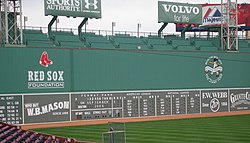
Ground rules are rules applying to the field, objects on and near it, and special situations relating to them, in the game of baseball. Major League Baseball has defined a set of "universal ground rules" that apply to all MLB ballparks; [1] individual ballparks have the latitude to set ground rules above and beyond the universal ground rules, as long as they do not directly contradict each other. Additionally, a set of universal ground rules exists for the six MLB stadiums with retractable roofs, with the individual ballparks able to set additional rules.
Contents
Unlike the well-defined playing field of most other sports, the playing area of a baseball field extends to an outfield fence in fair territory and the stadium seating in foul territory. The unique design of each ballpark, including fences, dugouts, bullpens, railings, stadium domes, photographer's wells and TV camera booths, requires that rules be defined to handle situations in which these objects may interact or interfere with the ball in play or with the players, and adaptable by ballpark within the universal rules.
The term is familiar to most fans through the ground rule double, a batted ball that bounces fair, then over the outfield fence in fair or foul territory for a two-base hit. This is, in fact, not a ground rule, as it is universally applicable to any baseball field.